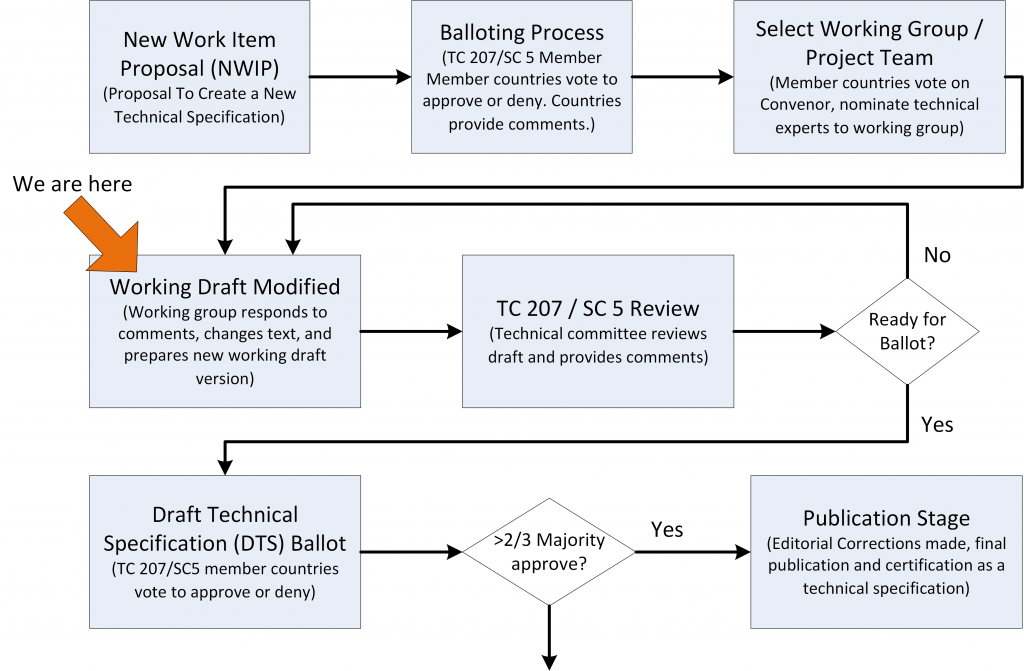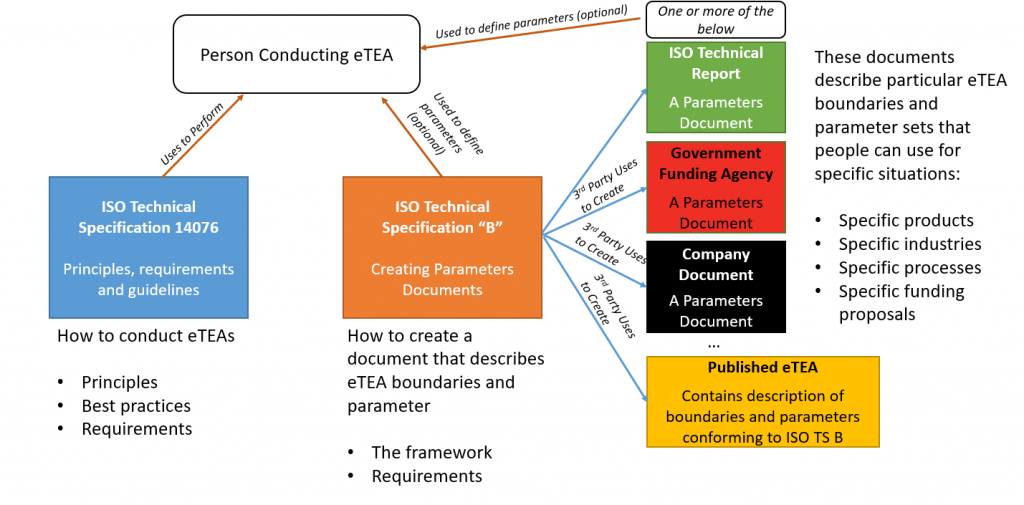PSEcommunity.org supports the development of a uniform set of standards that are used when conducting Eco-Techno-Economic Analyses (ETEAs) on chemical and energy process systems. The standards would provide a uniform basis for comparing one process design concept to another across literature studies. This is currently almost impossible to do because each individual research study uses its own methods, assumptions, and definitions when performing analyses of proposed process concepts. However, each research study that conducted its eTEA adhering to some standard could be directly compared to another other, using established procedures, with little effort.
Latest News: September 2023 Webinar on ISO 14076 Draft Status
The working group held a public webinar to update stakeholders on the status of the draft and gather feedback. Prof. Adams covers what eTEAs are, why we need a standard, and some of the key elements and scope of the current 14076 draft. Since 14076 is a work in progress, this webinar was also used to gather feedback from stakeholders about key technical points covered under the technical specification.
ISO/WD TS 14076: Eco-Technoeconomic Analyses: Principles, requirements and guidelines
The member countries of ISO TC 207/SC 5 voted overwhelmingly to approve the development of a new technical specification. A new working group was also formed to do the work of creating the text of the standard.
As the work progresses, status updates will be provided on the ISO’s development page for the TS 14076 document.
The basic process is as follows:

Overview of the Proposed Technical Specification
The technical details and actual text of the working draft of the technical specification will be developed in the working group in the coming months, and will require many iterations. The details are expected to evolve during this process. The up-to-date version of abstract can be found on the ISO’s development page for the TS 14076 document.
The key principles of this technical specification will include:
- Describing the basic principles, guideance, and best practices of an eco-technoeconomic analysis (eTEA)
- Specifying the framework in which an eTEA can be conducted
- Specifying the minimum requirements for conducting an eTEA.
The scope is general, and will apply to process systems at all scales and in all applications.
The proposed technical specification will not require or suggest particular numbers, methods, or parameters to use in an eTEA. It is intended to be general.
How the Proposed Technical Specification Fits into a Bigger Picture
The draft technical specification that has been approved and is currently in development focuses on principles, requirements, and guidance for conducting eTEAs in general.
The Project Leader (Prof. Adams) has proposed that this document should be created as a part of a larger picture, as shown below:

In this case, a second technical specification would be create that describes how to create a Parameters Document. A Parameters Document is something that describes the boundaries and parameters of the eTEA. Then, anyone could create a Parameters Document themselves that follows this standard. For example, an organization, such as a government agency, could require that eTEAs conform to a particular Parameters Document when used as part of a government grant proposal. Or, academic researchers could choose to follow a particular Parameters Document relevant to the particular technology or application of interest that was created by other researchers, academic bodies, or research societies. In this way, the ISO documents do not prescript particular methods or parameters, but they do enable the framework to make them usable in a standardized fashion.
It is important to note that this second technical specification for creating Parameters Documents have not been proposed or approved at the ISO, but the concept may inform the development of TS 14076.
Key Standardization Dates and Events
- Ongoing 2022 – Present: ISO TC 207 / SC 5 / WG 16 technical expert members meet regularly to develop the working draft. After various cycles and decisionmaking processes, the draft Technical Specification will be sent to ballot for vote by the member countries of ICO TC 207 / SC 5. Because of the confidential nature of the process, we cannot provide regular, detailed updates to the general public during this period.
- September 27, 2023. Public webinar on progress of the draft. [Watch recorded webinar]
- March 13, 2022. ISO TC 207/SC 5 member countries vote to approve Prof. Thomas Adams as the Convenor of a new Working Group to lead the development of the new technical specification, for a three year term. Prebantha Moodley of the University of the Witwatersrand, South Africa, has been selected as Secretary.
- March 2, 2022. ISO TC 207/SC 5 member countries vote to approve the development of a new technical specification for the standardization of eTEAs. The new document number is ISO 14076.
- February 19, 2022. The ballot will close! Please encourage your country’s member committee to vote for the proposal.
- January 20, 2022. The “Signal in the Noise” tour finally resumes after an almost two year pandemic pause! Although visits to two other countries had to be cancelled due to covid restrictions, Dr. Adams presented at Mälardalens Universitet in Sweden to an enthusiastic audience (hybrid in person/virtual).
- November 22, 2021. The ballot has been posted! Member countries may now vote on the proposal and whether to proceed with the project.
- November 8-10, 2021. A final summary was presented at the TC 207/SC 5 plenary, and some committee member questions were addressed.
- October 2021. Revised proposal to develop an ISO Technical Specification and associated draft standard has been approved by the Canadian Mirror Committee to ISO TC 207 / SC 5, and will be formally sent to ballot for consideration. Balloting likely to take open in November.
- April 26, 2021. eTEA standards update will be presented to the RAPID Manufacturing Institute.
- March 16-18, 2021. eTEA Standards Project Leadership will formally propose the project to the appropriate technical committee and subcommittee on Life Cycle analysis. This will launch a review period and a formal international vote.
- March 3, 2021. CSChE eTEA Advisory Group will meet to discuss the upcoming proposal to the ISO to formally launch the standards project with them.
- Nov 6, 2020. Initial proposal presented to ISO TC 207 / SC 5 plenary session. Delegation voted unanimously for a resolution to encourage a formal submission of a proposal for a technical standard for eTEAs. See Newsletter 4 for more information. See the presentation slides for more details.
- May 1, 2020. Update: Cancelled due to pandemic. The next stop of the tour is at MIT for the Department of Chemical Engineering Seminar Series in Cambridge, Massachusetts, USA, with a “Finding the Signal” lecture. Time and place TBD.
- Nov 26, 2019. We’ll be giving the “Maximizing Our Impact” lecture live on the AIChE’s Computing and Systems Technology Division’s Webinar Series at 11am Eastern Standard Time (i.e. Toronto/New York Time). You can join the webinar using this link. Participants can ask questions either by voice or chat message. The recorded video will be made available on APMonitor.com and their YouTube channel after the talk.
- Nov 11-13, 2019. We will be at the AIChE National Meeting in Orlando on these days. If you are going and want to meet to discuss the standards in person, email standards@psecommunity.org. UPDATE: Great conversations with interested people. More keep getting on board each visit!
- Oct 21, 2019. The next stop on the “Maximizing Our Impact” tour, ending where it began, will be at the Canadian Chemical Engineering Conference in Halifax, NS, at 4:30pm in Room 613 of the Halifax Convention Centre. Update: Great turnout with attendees from all disciplines. Thanks Halifax!
- Oct 4, 2019. The next “Maximizing Our Impact” presentation will be given at the University of British Columbia in Vancouver, Canada at 1pm in CHBE 102. Update: Standing room only!!! Thanks Vancouver!
- Sep 20 2019. Another “Maximizing Our Impact” presentation given at West Virginia University to a packed house.
- Sep 19, 2019. Visit with the US Department of Energy, National Energy Technology Laboratory in Pittsburgh, PA, to discuss the ISO standards development and other issues.
- Aug 30, 2019. Another “Maximizing Our Impact” presentation to Eastman Chemical.
- Aug 6, 2019. The ISO Standards Development lecture tour continues, with a “Maximizing Our Impact” presentation at Hatch’s Lunch-and-Learn series.
- July 17, 2019. A formal call for the development of a standards committee took place at the Foundations of Computer Aided Process Design (FOCAPD) 2019 meeting at the Copper Mountain Resort in Colorado, USA, from July 14-19, 2019. The presentation focused specifically on the standardization approach. Slides available at LAPSE:2019.0620
- July 11, 2019. The Standards Council of Canada has agreed to champion the standards development process. They have requested letters of support from industry, academics, government, or any stakeholder who could find value or need in such a standard. See “Get Involved” below for information on how to help!
- July 10, 2019. The article “Maximizing our impact: A call for the standardization of techno-economic analyses for sustainable energy systems design research” by Thomas A. Adams II has been published in Computer Aided Chemical Engineering, vol 47, p359-364 (2019). The article makes the technical case for standardization and contains a more detailed form of the concepts presented at the FOCAPD 2019 conference (previous bullet). The conference proceedings are available here [if paywalled, ask your library].
- April 1, 2019. Lecture at the University of Connecticut: “Finding the Signal in the Noise” by Prof. Thomas A. Adams II. See previous bullet.
- April 1, 2019. Lecture at the University of Calgary: “Finding the Signal in the Noise” by Prof. Thomas A. Adams II will discuss the results of a recent-meta study on TEAs for carbon dioxide capture technology, and make a case for TEA standardization. Slides available at LAPSE:2019.0442
Get Involved
In order to create and adopt a universal standard, we need the involvement and input from stakeholders across the spectrum. Here is how you can get involved:
- Join a committee or working group. People who are members of the ISO-recognized national standards organization for their home country can ask to participate in the working group by joining their country’s mirror committee to TC 207 / SC 5 and asking to be recommended as a technical expert to work on TS 14076. Contact your national committee for details.
- Provide feedback and input. Stakeholders can provide advice, input, feedback, and other helpful input to their country’s mirror committee to TC 207 / SC 5, which can provide official comment on working drafts of the technical specification during various points in its development.
- Encourage standards adoption. Once released, everyone can help by encouraging (and using) the standard in your workplace, your classroom, your publications, and in your own work.
